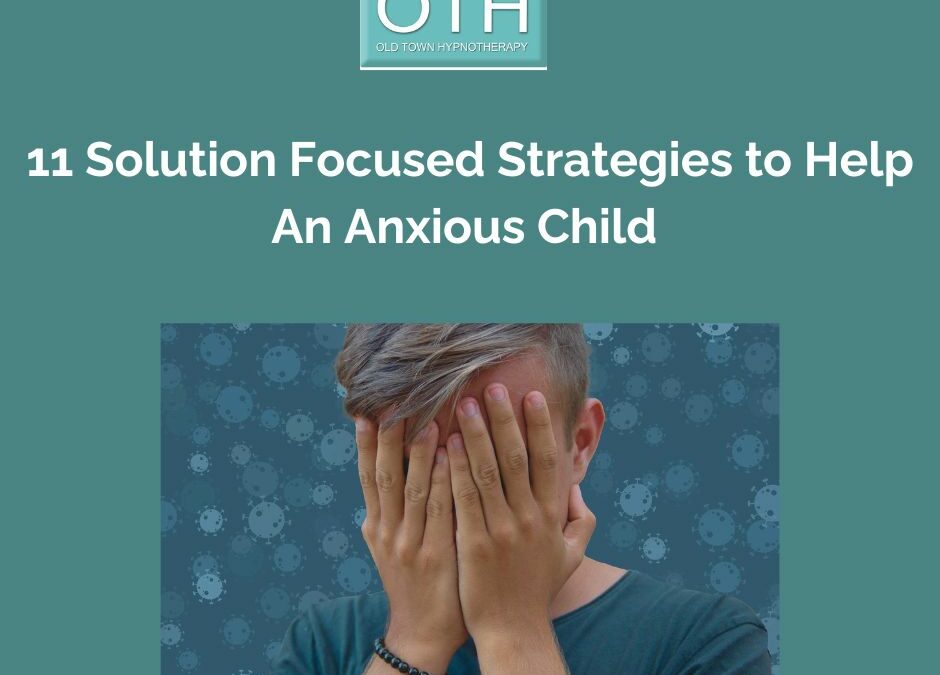
11 Solution Focused Strategies to
Help An Anxious Child
Over my years of clinical practice, I have seen an increasing number of children presenting with symptoms of anxiety. This trend is not isolated to Old Town Hypnotherapy, referrals of children to mental health services, primarily due to anxiety have doubled pre-pandemic figures. Approximately 20% of children and young people aged 8 to 25 years had a probable mental disorder in 2023 (nhs.net). These statistics are staggering. The reasons why are our children are facing a mental health crisis are complex and involve academic, social, and personal pressures. Traditional approaches to managing anxiety often focus on analysing the root causes, but the solution-focused approach we use at Old Town Hypnotherapy is quite different. We are trained to emphasis positive outcomes, identify strengths, and develop practical strategies for moving forward. We avoid problem talk and instead focus on helping the child find their solution. Solution focused therapy helps children develop resilience, confidence, and coping skills to manage their anxiety effectively. We always encourage parents to stay in the therapy room so they can learn about the Solution Focused approach and support it at home.
Here are 11 key strategies that we use in clinic to support anxious children in a solution-focused way.
- Encourage Strength-Based Thinking
One of the core principles of a solution-focused approach is focusing on what a child can do rather than what they struggle with. We focus on past success with questions like “Can you remember a time when you felt really brave.” Or “What did you do that helped you last time you felt worried?” Shifting their mindset from fear to confidence. Identifying strengths helps children recognise that they have the ability to overcome their worries.
- Set Small, Achievable Goals
Anxious children can feel overwhelmed by large challenges. Breaking down tasks into small, manageable steps can make them more approachable. It would be up to the child rather than the therapist to identify the small steps. For example, if a child is afraid of doing a presentation in front of the class, a small step might be to put their hand up to answer one question a day for a week. The therapist job would be to ask the right questions, so the child comes up with a strategy that works for them. At the start of each session, we would be celebrating the wins with lots of enthusiasm, reinforcing their ability to cope and building momentum for the next step forward.
- Use Positive Language and Reframing
Language plays a crucial role in shaping a child’s perception of their anxiety. Instead of labelling a child as “shy” or “fearful,” we would describe them as “thoughtful” or “cautious but brave.” Reframing their experiences can help them develop a more empowering self-view. For instance, instead of saying, “You’re scared of new situations,” we might say, “You take time to get comfortable in new situations, and that’s okay.” This shifts their focus from fear to adaptability.
- Hypnosis and Relaxation Techniques
Children have wonderful imaginations and a natural tendency to enter a trance state, so they usually respond well to hypnosis. In clinic we use various calming techniques with children, such as breathing exercises, visualisation, grounding exercises and storytelling. Teaching children how to calm their nervous system and relax can help them regulate and control their emotions.
- Encourage Problem-Solving Skills
A solution-focused approach empowers children to take control of their problems by finding solutions. When a child is anxious, instead of immediately offering reassurance, ask them, “What do you think might help in this situation?” or “If your best friend had this problem, what advice would you give them?” Encouraging children to generate their own solutions helps them feel more capable and reduces feelings of helplessness.
- Create a Predictable and Supportive Environment
Children with anxiety usually feel more secure when they have structure and predictability. A regular bedtime routine, for example. Routines provide a sense of predictability and control, reducing uncertainty and fear of the unknown and fostering feeling of safety and stability. In clinic, our sessions always follow the same format, so there are no surprises.
- Use Visualisation and Future-Focused Thinking
Visualisation is a powerful tool in a solution-focused approach, our imaginations are the rehearsal room to reality. Encouraging children to imagine themselves successfully handling a challenging situation can not only increase their confidence but lay down neuro-pathways for the future. Questions like, “How would future-you handle this tricky situation?” This approach helps children see a positive outcome and work toward it with confidence.
- Use Reward and Reinforcement Systems
Positive reinforcement encourages children to practice coping skills and face challenges. In clinic we offer copious amounts of praise and (depending on age) stickers to celebrate their progress. A solution-focused approach celebrates effort rather than just results, reinforcing the idea that progress, no matter how small, is a success.
- Encourage Flexible Thinking
Anxious children often have rigid thought patterns, such as “I will fail” or “Nobody likes me.” We might encourage them to consider alternative perspectives using questions like, “What’s another way to look at this?” or “What’s the best possible outcome?” This approach helps them develop cognitive flexibility and reduces catastrophic thinking.
Helping anxious children in a solution-focused way means empowering them with tools to build resilience, confidence, and problem-solving skills. By focusing on their strengths, setting small goals, reframing negative thoughts, and creating a supportive environment, we can equip them to manage their anxiety effectively. This proactive approach fosters independence and emotional well-being, allowing children to navigate challenges with greater confidence and self-assurance.
At Old Town Hypnotherapy, a number of our therapists have undergone further specialist training to work with children. We offer free initial consultations and recommend parents or caregivers attend with their child to learn more about how we can help. We work with Children over 8 years old and offer appointments in Swindon, Marlborough and Online.

